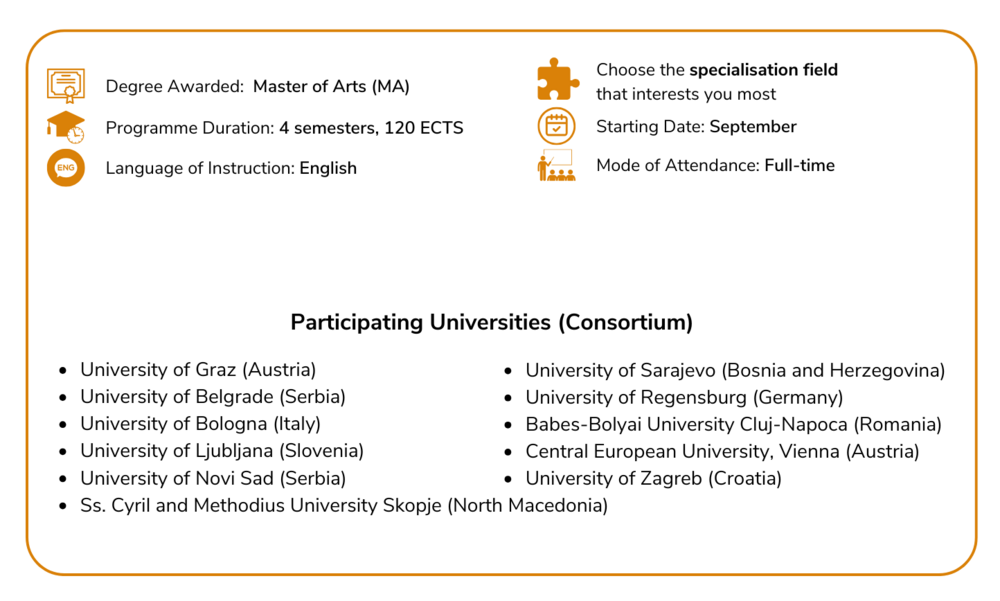The English-taught Master's Programme in Southeast European Studies is a full-time master's programme. The mission of the Joint Master Programme in Southeast European Studies is to provide an international and interdisciplinary master programme in social sciences and humanities of highest quality, which enables participants to effectively understand the interrelationship between history, law, politics, economics and culture with strong emphasis on the region of Southeastern Europe.
The programme offers two focus areas, one in Southeast European History and one in Law and Politics in Southeastern Europe. While Belgrade is running the joint interdisciplinary programme, in Graz the programme offers two focus areas, one in Southeast European History and one in Law and Politics in Southeastern Europe. In both versions, the programme promotes the capacity for academic analysis, especially by applying an inter- and transdisciplinary approach which includes areas of legal, political, economic and cultural studies.
The programme aims at strengthening and understanding the role of gender in academia, society and politics.
The programme is organised as a Joint Programme, which means that students benefit from a highly internationally oriented programme with a mandatory mobility period included.
The Master's Programme in Southeast European Studies comprises 120 ECTS credits corresponding to a period of study of at least four semesters or two years. As a student of the Master’s programme you have to earn at least 60 ECTS at your entrance university (30 ECTS in courses and 30 ECTS for your Master’s Thesis) and you have to earn at least 30 ECTS at your mobility university during the integrated mobility semester as a mandatory requirement for graduation.
Detailed information on the structure of the programme can be found in the section “Study Path”.
Admission requirements
You need an academic degree of at least 180 ECTS credits or equivalent. As applicant you must demonstrate a basic knowledge of social sciences or humanities - law, political, social, cultural or economic sciences - and have a general insight and interest in Southeastern Europe.
Because this is an English-taught programme, English language proficiency must be proven.

For non-native English speakers, evidence of English language proficiency that meet the admission requirements is required.
This is to be proven by the following certificates and/or during the interview:
- IELTS Academic (required minimum score: 6.0),
- TOEFL iBT (required minimum score: 78),
- Cambridge (required level: FCE) or
- an equivalent certificate.
Applicants with a test after the application deadline but before the date of admission can be conditionally admitted to the programme.
Exception: English-native speakers (i.e., applicants who have completed their secondary school education in an English-speaking country) and those who successfully completed an English-taught Bachelor's programme.
The universities in the consortium work together to guarantee a high-quality international curriculum with regional aspects.
The University of Graz and the University of Belgrade can be chosen as entrance universities for the programme. The entrance university is defined as the university where you start and finish the programme and is also a degree-awarding university within the consortium.
Please note that for the call for applications 2025/26 you can only choose the University of Graz as your entrance university and enroll there as a student of the Master’s Programme in Southeast European Studies.
Please also note that a double degree option between the University of Graz and the University of Ljubljana is open to two students within the “law and politics” track with an academic background in international relations who are interested in a mobility at the University of Ljubljana.
Detailed information on the double degree option can be found in the section “Study Path”.
You can spend your mandatory mobility semester at the following partner universities, but you cannot enroll there as your entrance university:
- University of Belgrade
- Babeş-Bolyai University of Cluj
- University of Bologna
- Central European University (Vienna)
- University of Ljubljana
- University of Novi Sad
- University of Regensburg
- University of Sarajevo
- University of Skopje
- University of Zagreb

